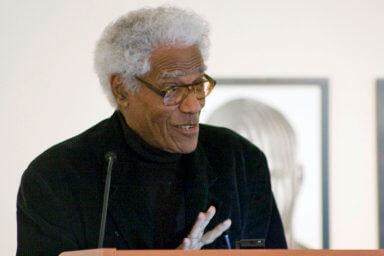Renowned Barbadian novelist George Lamming dies at 94

Renowned Barbadian novelist George Lamming, a leading writer of the Caribbean’s colonial experience, died on Saturday, June 4, at 94.
Barbados Prime Minister Mia Mottley said that she had planned to visit the author on his 95th birthday, just four days away.
“Wherever George Lamming went, he epitomized that voice and spirit that screamed Barbados and the Caribbean,” she said in a statement. “And while he has written several novels and received many accolades, none of his works touches the Barbadian psyche like his first — ‘In The Castle of My Skin’, written back in 1953, but which today ought still to be required reading for every Caribbean boy and girl.
“Barbados will miss George Lamming — his voice, his pen, and of course, his signature hairstyle,” Mottley added. “But I pray that the consciousness of who we are that he preached in all that he wrote will never fade from our thoughts.”
Born in Carrington Village, Barbados, on Jun. 8, 1927, Lamming attended Roebuck Boys’ School and then won a scholarship to the historic Combermere School, according to Global Voices, an international, multilingual, primarily volunteer community of writers, translators, academics and human rights activists, headquartered in Amsterdam, The Netherlands.
It said Lamming’s teacher, Frank Collymore, the “Barbadian Man of the Arts” and publisher of the literary journal BIM, mentored him, “and his passion for reading began; he started to write poetry.”
Global Voices said Lamming left for Trinidad in 1946, where he was a school teacher for four years at El Collegio de Venezuela in Port-of-Spain, the Trinidad capital.
He then migrated to England, where he worked in a factory for a short time, Global Voices said, adding that, in 1951, he became a broadcaster for the BBC Colonial Service.
Global Voices said Lamming entered academia in 1967 as a writer-in-residence and lecturer at the Creative Arts Centre and Department of Education at the University of the West Indies.
It said he later served as a visiting professor and writer-in-residence at the City University of New York, and as a faculty member and lecturer at the University of Texas at Austin and the University of Pennsylvania.
He was also a distinguished visiting professor at Duke University and a visiting professor of Africana Studies and Literary Arts at Brown University, according to Global Voices.
Throughout his life, it said he also taught or lectured at universities in Tanzania, Denmark and Australia.
“Although he claimed to be a ‘slow writer,’ Lamming wrote a total of six novels and four non-fiction books,” Global Voices said.
It said Lamming’s novels included “The Emigrants” (1954), “Of Age and Innocence” (1958), “Season of Adventure” (1960) and “Water with Berries” (1971).
Included in his non-fiction works was a collection of essays called “The Pleasures of Exile”, which explores how culture, politics and individual identity were shaped by colonialism, Global Voices said.
It said Lamming did not just write books. During the 1960s, he and several other writers collaborated on a radio series entitled “New World of the Caribbean,” which looked at the region’s place in the world, Global Voice said.
“As a teacher and lecturer, his voice was heard, and listened to, across the Caribbean and beyond,” it said.
Mottley said Lamming was “the quintessential Bajan, born in as traditional a district as you can get — Carrington Village, on the outskirts of Bridgetown.
“And his education was as authentically Bajan as one could possibly acquire — Roebuck Boys’ School and Combermere”, she added. “As Bajan as he was, he still distinguished himself as a world scholar.
“On behalf of the Government and people of Barbados, I extend deepest sympathy to the Lamming family,” continued Mottley, stating that an official funeral will be held at a date to be announced.
The Caribbean Community (CARICOM) on Sunday joined with the people of Barbados in mourning the passing of Lamming.
CARICOM Secretary General Dr. Carla Barnett described Lamming as a poet, novelist, essay writer, orator, lecturer, teacher, editor and tireless activist.
“George Lamming was more than a literary icon,” she said in a statement. “He was an authentic Caribbean voice.”
In conferring the Community’s highest award, Order of the Caribbean Community (OCC), on Lamming in 2008, his citation noted that CARICOM was honoring “fifty-five years of extraordinary engagement with the responsibility of illuminating Caribbean identities, healing the wounds of erasure and fragmentation, envisioning possibilities, transcending inherited limitations and applauded his intellectual energy, constancy of vision, and an unswerving dedication to the ideals of freedom and sovereignty.”
“Those words fully encapsulated his extraordinary contribution to the region he loved unreservedly and to which he dedicated his considerable skill,” Dr. Barnett said. “Our Community is richer for his interventions and poorer for his loss.
“George Lamming has left a treasure trove of works, which remain relevant and reflects the Caribbean condition,” she added. “I extend deepest condolences to the family of Mr. Lamming and the Government and people of Barbados on the death of this true Caribbean icon.”





